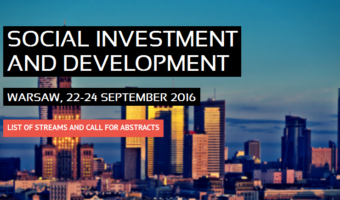The conference gathered many scientists interested in policy dimension of housing, innovations, availability of public data, labour market, migrations and others. Keynote speaker, Professor Jochen Clasen (University of Edinburgh), delivered a lecture on active labour market policy. Jochen Clasen stressed that active labour market policy (ALMP) enriches welfare state research, but challenges need to be recognised: ‘new welfare state’ policies may require new theoretical thinking. Professor emphasized also the need for dialogue between quantitative and qualitative approaches.
FUEL POVERTY AS A HOUSING PROBLEM
One of the main topics of the conference was housing. Three-part session chaired by Ryszard Szarfenberg (IPS UW) and Joanna Zubrzycka-Czarnecka (IPS UW) focused mainly on social housing (e.g. Andrzej Przymeński – UEP, Zuzanna Rataj – UEP), rental market (Hanna Milewska-Wilk – Mieszkanicznik, Michał Rubaszek – SGH), cohousing (Agata Twardoch – PŚ), theories of sociology of housing (Marcin Jewdokimow – UKSW) and others.
The most recent results of fuel poverty research conducted by Institute for Structural Research were presented by Konstancja Święcicka and Katarzyna Sałach. In 2014 the phenomenon concerned 9.6% of households in Poland (4.4 mln people). According to the results of cluster analysis including objective and subjective measure of the phenomenon – there were 4 groups most affected by fuel poverty: poor inhabitants of prewar town houses, poor inhabitants of damaged houses on villages, families with children living in big village houses and elderly singles in big village houses. According to the analysis of qualitative surveys, Konstancja Święcicka listed the strategies adopted by poor polish households, such as: collecting firewood in forest, constructing stoves sawdust or make random repairs.
Katarzyna Sałach presented high regional (10.6 percentage points) and rural/urban (15.8 pp) variation of fuel poverty in Poland. According to objective LIHC measure the highest ratios of fuel poverty were in east regions. Regional differences were mainly determined by income and dwellings surface variations, but the results were strongly influenced by the measure of the phenomenon.
IBS SESSION – INTERNATIONAL PERSPECTIVE OF FUEL POVERTY
During the last day of the conference Agata Miazga and Maciej Lis from Institute for Structural Research organized a session entitled „The energy dimension of poverty: an international perspective”. David Deller from University of East Anglia showed the differences between fuel poverty measures in time and between old and new member states of EU. Klavdiya Maksymenko from the World Bank in Ukraine described the social consequences of rapid increase of energy prices in Ukraine and the government policy aimed to reduce ensuing fuel poverty. The subsidies for fuel poor households were the main policy instrument. At the end Dominik Owczarek from Institute of Public Affairs in Warsaw summarized the previous research for Poland.
Conference programme is available online: http://www.espanetpolska2016.org/programme.html
Below are attached presentations connected with fuel poverty.


